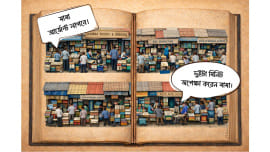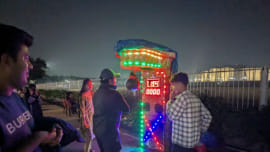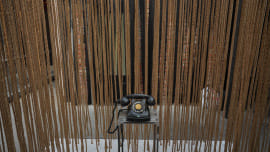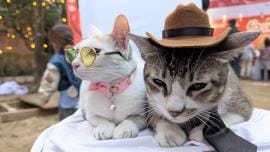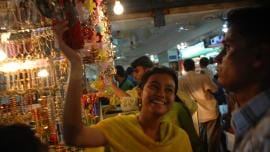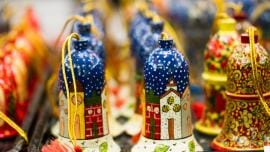Nilkhet as Dhaka’s unofficial academic support system
8 February 2026, 22:11 PM
My Dhaka
Dhaka as seen through windows
6 February 2026, 13:22 PM
My Dhaka
My Dhaka / Dhaka metro rail proves public transport can actually work
2 February 2026, 15:04 PM
My Dhaka
Dhaka’s new obsession with punching (quite literally!)
29 January 2026, 19:34 PM
My Dhaka
Parallels: A unique architectural exhibition now showing at Aloki
28 January 2026, 22:35 PM
My Dhaka
My Dhaka / Two weeks of ceremonious winter in Dhaka
26 January 2026, 09:24 AM
My Dhaka
Why hospital bills scare Dhaka patients more than disease
16 January 2026, 15:02 PM
My Dhaka
Pets are not accessories
11 January 2026, 21:25 PM
My Dhaka / Navigate Dhaka’s maze of fashion and accessories
24 December 2025, 09:16 AM
My Dhaka
Celebrate December in Dhaka with handmade, local gift ideas
23 December 2025, 14:37 PM
My Dhaka
Party Votes Summary
Processed 2003 total candidates
BNP
Total Candidates:
289
Total Votes:
36,313,433
| # | Candidate | Seat | Votes |
|---|---|---|---|
| 1 | Gulam Mohammad Siraj | Bogura 5 | 248,841 |
| 2 | Mirza Fakhrul Islam Alamgir | Thakurgaon 1 | 238,836 |
| 3 | Md. Harun-ur-Rashid | Rajbari 2 | 237,254 |
| 4 | Salahuddin Ahmed | Coxs Bazar 1 | 222,019 |
| 5 | Md. Shahjahan | Noakhali 4 | 219,182 |
| 6 | A. K. M. Selim Reza Habib | Pabna 2 | 215,406 |
| 7 | Md. Khaled Hossain Mahbub | Brahmanbaria 3 | 209,636 |
| 8 | Md. Muzibur Rahman | Gazipur 1 | 208,688 |
| 9 | Md. Mustafizur Rahman Babul | Jamalpur 3 | 207,412 |
| 10 | Abu Zafar Md. Zahid Hossain | Dinajpur 6 | 203,887 |
| 11 | Md. Monirul Haque Chowdhury | Cumilla 6 | 201,706 |
| 12 | Dipen Dewan | Rangamati 1 | 201,544 |
| 13 | Anindya Islam Amit | Jashore 3 | 201,339 |
| 14 | Shah Md. Wares Ali Mamun | Jamalpur 5 | 199,344 |
| 15 | Md. Abdus Salam Pintu | Tangail 2 | 198,213 |
| 16 | Dewan Mohammad Salahuddin | Dhaka 19 | 190,976 |
| 17 | Mohammad Nurul Islam | Bhola 4 | 189,351 |
| 18 | M. Manjurul Karim Roni | Gazipur 2 | 188,606 |
| 19 | Md. Mizanur Rahman | Rajshahi 2 | 188,546 |
| 20 | S. M. Faisal | Habiganj 4 | 188,072 |
| 21 | Md. Shariful Alam | Kishoreganj 6 | 187,159 |
| 22 | Ariful Haque Chowdhury | Sylhet 4 | 186,846 |
| 23 | Md. Maminul Haque | Chandpur 5 | 185,404 |
| 24 | Md. Monowar Hossain | Magura 1 | 185,338 |
| 25 | Lutfur Rahman | Coxs Bazar 3 | 182,096 |
| 26 | Md. Shamsur Rahman Shimul Biswas | Pabna 5 | 181,925 |
| 27 | Md. Abu Wahab Akand Wahid | Mymensingh 4 | 179,668 |
| 28 | Md. Monjurul Islam | Dinajpur 1 | 179,314 |
| 29 | Iqbal Hassan Mahmud | Sirajganj 2 | 177,578 |
| 30 | Mohammad Shafiqul Haque Milon | Rajshahi 3 | 176,318 |
| 31 | Barrister Muhammad Nawshad Zamir | Panchagarh 1 | 176,169 |
| 32 | Md. Abdul Mazid | Jhenaidah 2 | 175,984 |
| 33 | Moinul Islam Khan | Manikganj 2 | 175,776 |
| 34 | Farhad Hossain Azad | Panchagarh 2 | 174,650 |
| 35 | Md. Aynul Haque | Sirajganj 3 | 174,430 |
| 36 | Khandaker Abdul Muktadir | Sylhet 1 | 173,932 |
| 37 | Md. Mostafizur Rahman | Naogaon 1 | 173,864 |
| 38 | Khondaker Abu Ashfaque | Dhaka 1 | 173,781 |
| 39 | M Rashiduzzaman Millat | Jamalpur 1 | 173,656 |
| 40 | Md. Asaduzzaman | Jhenaidah 1 | 173,381 |
| 41 | Md. Jalal Uddin | Chandpur 2 | 172,506 |
| 42 | M.A. Muhit | Sirajganj 6 | 171,508 |
| 43 | Kazi Rafiqul Islam | Bogura 1 | 171,440 |
| 44 | Md. Anwarul Haque | Netrakona 2 | 171,399 |
| 45 | Md. Abdul Aziz | Natore 4 | 170,551 |
| 46 | Md. Sohel Hosnain Kaikobad | Kurigram 2 | 170,335 |
| 47 | Md. Abul Kalam | Cumilla 9 | 170,008 |
| 48 | Md. Sharif Uddin | Rajshahi 1 | 169,902 |
| 49 | Md. Mujibur Rahman Chowdhury | Moulvibazar 4 | 169,608 |
| 50 | Zakaria Taher | Cumilla 8 | 169,178 |
| 51 | Md. Abdullah | Munshiganj 1 | 167,562 |
| 52 | Afroza Khanam | Manikganj 3 | 167,345 |
| 53 | Md. Fazle Huda | Naogaon 3 | 166,889 |
| 54 | Reza Ahammed | Kushtia 1 | 165,909 |
| 55 | Akhtaruzzaman Mia | Dinajpur 4 | 165,577 |
| 56 | Sk Farid Ahmed | Chandpur 3 | 165,404 |
| 57 | Mahmud Hasan Khan | Chuadanga 2 | 163,877 |
| 58 | Md. Amanullah Aman | Dhaka 2 | 163,793 |
| 59 | Md. Mobasher Alam Bhuiyan | Cumilla 10 | 163,667 |
| 60 | Sardar Md. Sakhawat Hossain | Narsingdi 4 | 163,392 |
| 61 | M. Ruhul Quddus Talukder Dulu | Natore 2 | 162,841 |
| 62 | Md. Shahjahan Mia | Chapainawabganj 1 | 162,515 |
| 63 | Md. Tamiz Uddin | Dhaka 20 | 162,504 |
| 64 | S. M. Rafiqul Islam | Gazipur 3 | 162,343 |
| 65 | Kamruzzaman Kamrul | Sunamganj 1 | 161,774 |
| 66 | Khairul Kabir Khokon | Narsingdi 1 | 161,405 |
| 67 | M Akbar Ali | Sirajganj 4 | 161,278 |
| 68 | Md. Lutfuzzaman Babar | Netrakona 4 | 160,801 |
| 69 | Kazi Shah Mofazzal Hossain (Kaikobad) | Cumilla 3 | 159,291 |
| 70 | Mostafizur Rahman Bhuiyan | Narayanganj 1 | 158,358 |
| 71 | Barrister Kaiser Kamal | Netrakona 1 | 158,343 |
| 72 | Morshed Milton | Bogura 7 | 158,196 |
| 73 | Md. Abdul Bari | Joypurhat 2 | 158,065 |
| 74 | Mr. Abdul Awal Mintu | Feni 3 | 157,425 |
| 75 | Nasser Rahman | Moulvibazar 3 | 156,757 |
| 76 | Azharul Islam Mannan | Narayanganj 3 | 155,400 |
| 77 | Md. Mosharraf Hossain | Bogura 4 | 155,339 |
| 78 | Md. Masud Rana Prodhan | Joypurhat 1 | 155,309 |
| 79 | Md. Aminul Islam | Chapainawabganj 2 | 155,119 |
| 80 | Ali Nawaz Mahmud Khayum | Rajbari 1 | 154,541 |
| 81 | Faqir Mahbub Anam | Tangail 1 | 153,932 |
| 82 | Professor Nazrul Islam | Rajshahi 5 | 153,425 |
| 83 | Md. Sharifuzzaman | Chuadanga 1 | 153,193 |
| 84 | Ershad Ullah | Chattogram 8 | 152,969 |
| 85 | Altaf Hossain Chowdhury | Patuakhali 1 | 152,087 |
| 86 | Kalim Uddin Ahmed | Sunamganj 5 | 151,915 |
| 87 | Abdul Wadud Bhuiyan | Khagrachhari 1 | 151,040 |
| 88 | Md. Robiul Awal | Tangail 6 | 150,952 |
| 89 | Mohammad Mahadi Hassan | Jhenaidah 3 | 149,821 |
| 90 | Mohammad Ali Asghar | Khulna 5 | 148,854 |
| 91 | Nayab Yusuf Ahmed | Faridpur 3 | 148,545 |
| 92 | Nitai Roy Chowdhury | Magura 2 | 147,896 |
| 93 | Mohammad Fakhrul Islam | Noakhali 5 | 147,808 |
| 94 | Md. Abu Sayed Chad | Rajshahi 6 | 147,672 |
| 95 | Md. Faridul Kabir Talukder | Jamalpur 4 | 147,406 |
| 96 | Mir Mohammed Helal Uddin | Chattogram 5 | 147,054 |
| 97 | Ms. Sabira Sultana | Jashore 2 | 146,447 |
| 98 | Md. Abul Khair Bhuiyan | Lakshmipur 2 | 146,321 |
| 99 | Hafiz Uddin Ahmed | Bhola 3 | 145,990 |
| 100 | Mir Shah Alam | Bogura 2 | 145,024 |
| 101 | S. M. Jahangir Hossain | Dhaka 18 | 144,715 |
| 102 | Md. Sadiq Reaz | Dinajpur 2 | 144,317 |
| 103 | Md. Hasan Zafir Tuhin | Pabna 3 | 144,206 |
| 104 | Raghib Rauf Chowdhury | Kushtia 2 | 143,821 |
| 105 | Advocat Md. Jalal Uddin | Kishoreganj 2 | 143,669 |
| 106 | Mohammad Shamim Kaiser | Gaibandha 4 | 142,772 |
| 107 | Alhaj Md. G.K. Gaus | Habiganj 3 | 142,348 |
| 108 | Sardar Sarfuddin Ahmed | Barishal 2 | 141,622 |
| 109 | Saching Prue | Bandarban 1 | 141,455 |
| 110 | Dr. Khandaker Mosharraf Hossain | Cumilla 1 | 141,440 |
| 111 | Abul Kalam Azad Siddique | Tangail 7 | 141,253 |
| 112 | Md. Barkat Ullah Bulu | Noakhali 3 | 141,031 |
| 113 | Professor Dr. Syed Mainul Hassain Sadik | Gaibandha 3 | 139,864 |
| 114 | Mushfiqur Rahman | Brahmanbaria 4 | 139,842 |
| 115 | Asadul Habib Dulu | Lalmonirhat 3 | 139,651 |
| 116 | Mohammad Emdadul Haque Bhorsa | Rangpur 4 | 139,616 |
| 117 | Syed Mehdi Ahmed Roomy | Kushtia 4 | 139,603 |
| 118 | Syed Jahangir Alam | Dinajpur 3 | 139,207 |
| 119 | Md. Hasan Rajib Prodhan | Lalmonirhat 1 | 138,686 |
| 120 | S. A. Jinnah Kabir | Manikganj 1 | 137,773 |
| 121 | Md. Ashraf Uddin | Narsingdi 5 | 137,690 |
| 122 | Md. Nazrul Islam Molla | Barguna 1 | 136,145 |
| 123 | Md. Shahiduddin Chowdhury Annie | Lakshmipur 3 | 135,612 |
| 124 | Md. Mujibur Rahman Sarwar | Barishal 5 | 135,146 |
| 125 | Md Enamul Hoque | Chattogram 12 | 135,044 |
| 126 | Md. Amirul Islam Khan | Sirajganj 5 | 134,989 |
| 127 | Shahrin Islam | Nilphamari 2 | 134,579 |
| 128 | Md. Shamsuzzoha Khan | Naogaon 2 | 134,533 |
| 129 | Md. Jashim Uddin | Cumilla 5 | 134,485 |
| 130 | Ekramul Bari Tipu | Naogaon 4 | 133,924 |
| 131 | Md. Habibur Rahman (Habib) | Pabna 4 | 133,874 |
| 132 | A. K. M. Fazlul Haque Milan | Gazipur 5 | 133,869 |
| 133 | A N M Ehsanul Hoque Milon | Chandpur 1 | 133,032 |
| 134 | Md. Jahidur Rahaman | Thakurgaon 3 | 132,797 |
| 135 | Md. Fazlur Rahman | Kishoreganj 4 | 132,472 |
| 136 | Matiar Rahman Faraji | Jashore 4 | 131,917 |
| 137 | Sultan Salauddin Tuku | Tangail 5 | 131,279 |
| 138 | Joynal Abdin | Feni 2 | 131,210 |
| 139 | Najmul Mostafa Amin | Chattogram 15 | 130,661 |
| 140 | Md. Shafiqur Rahman (Kiran) | Shariatpur 2 | 129,814 |
| 141 | Md. Zahidul Islam Dhulu | Naogaon 5 | 129,358 |
| 142 | Mohammad Zakir Hossain | Mymensingh 5 | 128,896 |
| 143 | Nurul Amin | Chattogram 1 | 128,799 |
| 144 | Md. Rajib Ahsan | Barishal 4 | 128,322 |
| 145 | Md. Shahidul Islam | Faridpur 4 | 127,443 |
| 146 | Md. Abdul Mohit Talukder | Bogura 3 | 127,406 |
| 147 | Md. Harunur Rashid | Chapainawabganj 3 | 127,037 |
| 148 | Md. Zakir Hossain Sarker | Kushtia 3 | 126,909 |
| 149 | A. M. Mahbub Uddin | Noakhali 1 | 126,833 |
| 150 | Abu Mansur Sakhawat Hasan | Habiganj 2 | 126,583 |
| 151 | Khandaker Nasirul Islam | Faridpur 1 | 126,475 |
| 152 | Sarwar Jamal Nizam | Chattogram 13 | 126,192 |
| 153 | S M Monirul Hassan (Bappi) | Khulna 6 | 124,710 |
| 154 | Md. Kamruzzaman | Munshiganj 3 | 124,691 |
| 155 | Alamgir Mohammad Mahfuzullah Farid | Coxs Bazar 2 | 124,660 |
| 156 | Nazrul Islam Azad | Narayanganj 2 | 124,291 |
| 157 | Mohammad Mazharul Islam | Kishoreganj 1 | 124,035 |
| 158 | ABM Mosharraf Hossain | Patuakhali 4 | 124,013 |
| 159 | Md. Rokon Uddin Babul | Lalmonirhat 2 | 123,946 |
| 160 | Shahjahan Chowdhury | Coxs Bazar 4 | 123,582 |
| 161 | Azizul Baree Helal | Khulna 4 | 123,162 |
| 162 | Saifur Rahman Rana | Kurigram 1 | 123,025 |
| 163 | Sayeed Al Noman | Chattogram 10 | 122,978 |
| 164 | Shama Obaid Islam | Faridpur 2 | 121,694 |
| 165 | Amir Ezaz Khan | Khulna 1 | 121,352 |
| 166 | Abdus Salam Azad | Munshiganj 2 | 121,154 |
| 167 | Dr. Md. Abdus Salam | Thakurgaon 2 | 121,017 |
| 168 | Munshi Rafiqul Alam | Feni 1 | 119,904 |
| 169 | Md. Anwarul Islam | Natore 3 | 119,768 |
| 170 | Md. Hafiz Ibrahim | Bhola 2 | 119,085 |
| 171 | Mohammad Fahim Chowdhury | Sherpur 2 | 118,472 |
| 172 | Rafiqul Islam Hilali | Netrakona 3 | 118,469 |
| 173 | Motahar Hossain Talukder | Mymensingh 2 | 118,438 |
| 174 | Ms. Tahsina Rushdeer | Sylhet 2 | 117,956 |
| 175 | Md. Saiful Islam | Rangpur 6 | 116,919 |
| 176 | Md. Selim Reza | Sirajganj 1 | 116,613 |
| 177 | Md. Abdur Rouf | Satkhira 2 | 116,293 |
| 178 | Amir Khosru Mahmud Chowdhury | Chattogram 11 | 115,999 |
| 179 | Mohammad Abdul Malik | Sylhet 3 | 115,450 |
| 180 | A. B. M Ashraf Uddin (Nizan) | Lakshmipur 4 | 115,199 |
| 181 | Abul Kalam | Narayanganj 5 | 114,799 |
| 182 | Kapil Krishna Mandal | Bagerhat 1 | 114,323 |
| 183 | Ahmed Azam Khan | Tangail 8 | 114,217 |
| 184 | Md. Golam Rabbani | Rangpur 5 | 114,141 |
| 185 | Esrat Sultana Elen Bhutto | Jhalokathi 2 | 113,419 |
| 186 | Dr. Muhammad Osman Farruk | Kishoreganj 3 | 112,466 |
| 187 | Gias Uddin Quader Chowdhury | Chattogram 6 | 112,237 |
| 188 | Reza Kibria | Habiganj 1 | 111,999 |
| 189 | Fakhr Uddin Ahmed | Mymensingh 11 | 111,230 |
| 190 | Habibur Rashid | Dhaka 9 | 111,212 |
| 191 | Emran Ahmed Chowdhury | Sylhet 6 | 109,917 |
| 192 | D. M. D. Ziaur Rahman | Rajshahi 4 | 109,461 |
| 193 | Muhammad Abu Sufian | Chattogram 9 | 109,388 |
| 194 | Sheikh Md. Rezaul Islam | Naogaon 6 | 108,866 |
| 195 | Lutfullahel Majed | Mymensingh 8 | 108,685 |
| 196 | Mia Nuruddin Ahmed Apu | Shariatpur 3 | 107,516 |
| 197 | Alamgir Hossain | Pirojpur 1 | 107,105 |
| 198 | Masud Arun | Meherpur 1 | 105,441 |
| 199 | Md. Lutfor Rahman | Tangail 4 | 105,342 |
| 200 | Ahmed Sohel Monjur | Pirojpur 2 | 105,185 |
| 201 | Hamidur Rahman | Dhaka 7 | 104,666 |
| 202 | Md. Shamsur Rahman | Pabna 1 | 104,245 |
| 203 | Sheikh Faridul Islam | Bagerhat 3 | 103,711 |
| 204 | Farzana Sharmin | Natore 1 | 102,726 |
| 205 | Syed Imran Saleh | Mymensingh 1 | 101,926 |
| 206 | Humam Quader Chowdhury | Chattogram 7 | 101,445 |
| 207 | Zahir Uddin Swapan | Barishal 1 | 100,552 |
| 208 | Biswas Jahangir Alam | Narail 1 | 99,975 |
| 209 | Md. Nasir Chowdhury | Sunamganj 2 | 99,522 |
| 210 | Goyasawar Chandra Roy | Dhaka 3 | 99,163 |
| 211 | Dr. Md. Mahabubur Rahman | Mymensingh 7 | 99,049 |
| 212 | Somnath Dey | Bagerhat 4 | 98,326 |
| 213 | Nasir Uddin Ahmed | Moulvibazar 1 | 98,282 |
| 214 | Nurul Islam | Sunamganj 4 | 98,092 |
| 215 | Mohammad Kayshar Ahmed | Sunamganj 3 | 97,313 |
| 216 | Anisur Rahman | Madaripur 3 | 96,188 |
| 217 | A. E. Sultan Mahmud Babu | Jamalpur 2 | 95,860 |
| 218 | Md. Nuruzzaman Liton | Jashore 1 | 93,542 |
| 219 | Md. Anisuzzaman Khan Babu | Gaibandha 2 | 92,890 |
| 220 | Dr. Abdul Moin Khan | Narsingdi 2 | 92,739 |
| 221 | M. A. Quayum | Dhaka 11 | 91,833 |
| 222 | Md. Nurul Islam | Barguna 2 | 90,643 |
| 223 | Shah Reazul Hannan | Gazipur 4 | 90,390 |
| 224 | Alhaj Syed Ali | Nilphamari 3 | 89,102 |
| 225 | Bobby Hajjaj | Dhaka 13 | 88,387 |
| 226 | Md. Shawkatul Islam | Moulvibazar 2 | 88,381 |
| 227 | Nazrul Islam Manju | Khulna 2 | 88,197 |
| 228 | Md. Nabi Ullah | Dhaka 5 | 87,491 |
| 229 | Md. Shahadat Hossain | Lakshmipur 1 | 86,811 |
| 230 | Md. Amjad Hossain | Meherpur 2 | 85,988 |
| 231 | Md. Abdul Mannan | Brahmanbaria 5 | 85,769 |
| 232 | Yaser Khan Chowdhury | Mymensingh 9 | 85,761 |
| 233 | Md. Aminul Haque | Dhaka 16 | 85,467 |
| 234 | Md. Moniruzzaman | Satkhira 4 | 84,868 |
| 235 | Md. Shamsuzzaman Samu | Rangpur 3 | 84,578 |
| 236 | Md. Azizur Rahman | Kurigram 4 | 84,423 |
| 237 | Zainul Abdin Farooq | Noakhali 2 | 83,982 |
| 238 | Sanjida Islam | Dhaka 14 | 83,323 |
| 239 | Miskatul Islam Chowdhury | Chattogram 16 | 83,105 |
| 240 | SM Obaidul Haque | Tangail 3 | 82,769 |
| 241 | Abul Hossain Khan | Barishal 6 | 82,217 |
| 242 | Manzoor Elahi | Narsingdi 3 | 82,061 |
| 243 | Md. Abdul Gafur Sarker | Nilphamari 4 | 81,526 |
| 244 | Zainul Abedin | Barishal 3 | 80,930 |
| 245 | Shaikh Rabiul Alam | Dhaka 10 | 80,436 |
| 246 | Abul Hossain Azad | Jashore 6 | 80,141 |
| 247 | Tasvir Ul Islam | Kurigram 3 | 79,352 |
| 248 | Ishraque Hossain | Dhaka 6 | 78,850 |
| 249 | Sansila Zebrin | Sherpur 1 | 78,342 |
| 250 | Sayeed Ahmed | Shariatpur 1 | 77,398 |
| 251 | Md. Selim Bhuiyan | Cumilla 2 | 77,037 |
| 252 | Md. Kamrul Huda | Cumilla 11 | 76,638 |
| 253 | Alhajj Jashim Uddin Ahammed | Chattogram 14 | 76,493 |
| 254 | Mohammad Akhtaruzzaman | Mymensingh 10 | 75,585 |
| 255 | M Iqbal Hossain | Mymensingh 3 | 75,320 |
| 256 | Rakibul Islam | Khulna 3 | 74,845 |
| 257 | Tanveer Ahmed | Dhaka 4 | 74,447 |
| 258 | Md. Faruk Alam Sarker | Gaibandha 5 | 73,483 |
| 259 | Mostafa Kamal Pasha | Chattogram 3 | 73,037 |
| 260 | Tarique Rahman | Dhaka 17 | 72,699 |
| 261 | Md. Shahidul Alam Talukder | Patuakhali 2 | 72,676 |
| 262 | Md. Selimuzzaman Mollah | Gopalganj 1 | 69,462 |
| 263 | Md. Mokarram Hossain Sujan | Rangpur 1 | 69,407 |
| 264 | Md. Harunur Rashid | Chandpur 4 | 69,155 |
| 265 | M. A. Hannan | Brahmanbaria 1 | 68,092 |
| 266 | Sayed Ehsanul Huda | Kishoreganj 5 | 66,450 |
| 267 | Sheikh Mohammad Zakir Hossain | Bagerhat 2 | 66,409 |
| 268 | Nadira Akhter | Madaripur 1 | 64,524 |
| 269 | Md. Mahbuber Rahman | Noakhali 6 | 64,021 |
| 270 | Md. Ruhul Amin Dulal | Pirojpur 3 | 63,791 |
| 271 | Md. Shafiqul Islam Khan | Dhaka 15 | 63,517 |
| 272 | Rafiqul Islam Jamal | Jhalokathi 1 | 62,010 |
| 273 | Md. Jahandar Ali Mia | Madaripur 2 | 61,744 |
| 274 | S. M. Zilany | Gopalganj 3 | 60,991 |
| 275 | Mirza Abbas Uddin Ahmed | Dhaka 8 | 59,366 |
| 276 | Rashid Ahmad | Jashore 5 | 54,875 |
| 277 | Redwan Ahmed | Cumilla 7 | 48,509 |
| 278 | K. M. Babar | Gopalganj 2 | 40,048 |
| 279 | Khandoker Ziaul Islam Mohammad Ali | Gaibandha 1 | 37,997 |
| 280 | Mohammad Ali Sarkar | Rangpur 2 | 22,100 |
| 281 | AKM Qamruzzaman | Dinajpur 5 | 0 |
| 282 | Md. Rashed Khan | Jhenaidah 4 | 0 |
| 283 | A. Z. M. Fariduzzaman | Narail 2 | 0 |
| 284 | Kazi Alauddin | Satkhira 3 | 0 |
| 285 | Md. Mahmudul Haque Rubel | Sherpur 3 | 0 |
| 286 | Md. Akhtarul Alam | Mymensingh 6 | 0 |
| 287 | Tarique Rahman | Bogura 6 | 0 |
| 288 | Md. Sarowar Alamgir | Chattogram 2 | 0 |
| 289 | Md Aslam Chowdhury | Chattogram 4 | 0 |
Bangladesh Jamaat-e-Islami
Total Candidates:
227
Total Votes:
22,716,478
| # | Candidate | Seat | Votes |
|---|---|---|---|
| 1 | Muhammad Abdul Khaliq | Satkhira 2 | 266,959 |
| 2 | Md. Masud Parves | Chuadanga 1 | 211,041 |
| 3 | Md. Ruhul Amin | Chuadanga 2 | 208,011 |
| 4 | Md. Keramat Ali | Chapainawabganj 1 | 206,893 |
| 5 | Ali Azam Md. Abu Bakr | Jhenaidah 2 | 195,702 |
| 6 | Md. Izzat Ullah | Satkhira 1 | 193,772 |
| 7 | Md. Abdul Gafur | Kushtia 2 | 192,083 |
| 8 | Md. Nurul Islam | Chapainawabganj 3 | 189,640 |
| 9 | Md. Anowarul Islam | Dinajpur 6 | 188,719 |
| 10 | Md. Abdul Quader | Jashore 3 | 187,463 |
| 11 | Hafez Muhaj Rabiul Bashar | Satkhira 3 | 184,233 |
| 12 | Shahjahan Chowdhury | Chattogram 15 | 181,238 |
| 13 | Mohammad Moslehuddin Farid | Jashore 2 | 180,965 |
| 14 | Md. Amir Hamza | Kushtia 3 | 180,690 |
| 15 | Md. Golam Rasul | Jashore 4 | 176,912 |
| 16 | Md. Motiar Rahman | Jhenaidah 3 | 175,857 |
| 17 | Md. Mahbubur Rahman (Belal) | Rangpur 3 | 175,827 |
| 18 | Md. Golam Rabbani | Rangpur 5 | 175,208 |
| 19 | Mohammad Kamrul Ahsan | Mymensingh 4 | 171,880 |
| 20 | Md. Mujibur Rahman | Rajshahi 1 | 171,786 |
| 21 | Md. Mizanur Rahman | Chapainawabganj 2 | 171,227 |
| 22 | Md. Fazlur Rahman Sayed | Joypurhat 1 | 165,192 |
| 23 | Md. Iqbal Hossain | Pabna 5 | 164,994 |
| 24 | Abul Kausar Mohammad Nazrul Islam | Gaibandha 3 | 163,457 |
| 25 | Md. Rafiqul Islam Khan | Sirajganj 4 | 161,872 |
| 26 | Shahidul Alam (Bahadur) | Coxs Bazar 3 | 161,827 |
| 27 | Md. Elias Molla | Faridpur 1 | 154,772 |
| 28 | Md. Mahbubul Alam | Naogaon 1 | 153,816 |
| 29 | Md. Abul Kalam Azad | Khulna 6 | 150,724 |
| 30 | Md. Shah Alam Bakshi | Gazipur 1 | 149,553 |
| 31 | Md. Abdus Sattar | Nilphamari 1 | 149,224 |
| 32 | Md. Ishaq Khandaker | Noakhali 4 | 148,989 |
| 33 | Md. Afjal Hossain | Kushtia 4 | 148,201 |
| 34 | Muhammad Ali Asghar | Pabna 3 | 147,465 |
| 35 | Mia Golam Porwar | Khulna 5 | 146,246 |
| 36 | Al Faruq Abdul Latif | Nilphamari 2 | 145,202 |
| 37 | Md. Raihan Siraji | Rangpur 1 | 145,088 |
| 38 | Md. Dabibur Rahman | Bogura 5 | 143,329 |
| 39 | Md. Enamul Haque | Naogaon 2 | 141,526 |
| 40 | Md. Anwarul Islam | Kurigram 1 | 141,090 |
| 41 | Delwar Hossain | Thakurgaon 1 | 141,017 |
| 42 | Md. Mazedur Rahman | Gaibandha 1 | 140,726 |
| 43 | Md. Abdur Rahim Sarkar | Gaibandha 4 | 139,738 |
| 44 | Muhammad Zahidul Islam | Sirajganj 2 | 138,797 |
| 45 | Md. Abul Kalam Azad | Rajshahi 3 | 137,927 |
| 46 | Md. Abu Taleb Mandal | Pabna 4 | 137,675 |
| 47 | Md. Abdul Hakim | Natore 4 | 135,386 |
| 48 | Maulana Habibur Rahman | Sylhet 1 | 134,983 |
| 49 | Md. Iqbal Hossain Bhuiyan | Narayanganj 3 | 134,918 |
| 50 | Md. Maynul Alam | Dinajpur 3 | 134,618 |
| 51 | S. U. M Ruhul Amin Bhuiyan | Lakshmipur 2 | 133,698 |
| 52 | Syed Abdullah Mohammed Taher | Cumilla 11 | 133,308 |
| 53 | Gazi Enamul Haque | Jashore 5 | 132,876 |
| 54 | Masud Sayeedi | Pirojpur 1 | 132,659 |
| 55 | Md. Yunus Ali | Natore 2 | 130,066 |
| 56 | Mohammad Nojibur Rahman | Pabna 1 | 129,974 |
| 57 | Abdullah Al Faruk | Coxs Bazar 1 | 129,728 |
| 58 | Md. Anwarul Islam Raju | Lalmonirhat 1 | 129,572 |
| 59 | Md. Shafiul Alam | Panchagarh 2 | 128,862 |
| 60 | Md. Rashidul Islam Rashed | Sherpur 1 | 127,811 |
| 61 | Md. Aftab Uddin Mollah | Dinajpur 4 | 127,666 |
| 62 | Abdul Muntakim | Nilphamari 4 | 124,865 |
| 63 | Mobarak Hossen | Cumilla 5 | 124,547 |
| 64 | Md. Abdut Tawab | Faridpur 3 | 124,115 |
| 65 | Md. Borhan Uddin | Noakhali 3 | 123,941 |
| 66 | Muhammad Yasin Arafath | Cumilla 10 | 123,733 |
| 67 | Md. Tajuddin Khan | Meherpur 1 | 123,271 |
| 68 | Md. Rezaul Karim | Lakshmipur 3 | 122,802 |
| 69 | Md. Abdul Karim | Gaibandha 2 | 122,630 |
| 70 | Nur Ahmed Anwary | Coxs Bazar 4 | 122,033 |
| 71 | Mohammed Shafiqul Islam | Kishoreganj 2 | 120,975 |
| 72 | Mohammad Belayet Hossain | Noakhali 5 | 120,453 |
| 73 | Kazi Din Mohammed | Cumilla 6 | 119,851 |
| 74 | Md. Mahfuzur Rahman | Naogaon 3 | 119,421 |
| 75 | Muhammad Azizur Rahman | Jashore 1 | 119,093 |
| 76 | Syed A. K. M. Sarowar Uddin Seddique | Cumilla 9 | 118,961 |
| 77 | Md. Nurul Amin | Rangpur 6 | 118,890 |
| 78 | Ataur Rahman | Narail 2 | 118,142 |
| 79 | Sheikh Manjurul Haque (Rahad) | Bagerhat 2 | 117,709 |
| 80 | Md. Mashiur Rahman Khan | Bagerhat 1 | 117,527 |
| 81 | Md. Matiur Rahman | Dinajpur 1 | 117,481 |
| 82 | Md. Firoz Haider | Lalmonirhat 2 | 117,252 |
| 83 | Md. Mushtarshed Billah | Magura 2 | 117,018 |
| 84 | Md. Abdul Alim | Bagerhat 4 | 116,067 |
| 85 | Md. Abdul Hakim | Thakurgaon 2 | 115,707 |
| 86 | Md. Abdul Bari Sarkar | Rajshahi 4 | 115,226 |
| 87 | Muhammad Abdus Sattar | Jamalpur 5 | 113,201 |
| 88 | Mohammad Nazrul Islam | Dhaka 1 | 112,622 |
| 89 | Md. Noor Mohammad | Bogura 3 | 111,026 |
| 90 | Md. Yousuf Sohel | Cumilla 3 | 109,599 |
| 91 | Md. Mustafa Faisal | Bogura 4 | 108,978 |
| 92 | Md. Shahinur Alam | Sirajganj 1 | 108,815 |
| 93 | Obaidullah Salafi | Nilphamari 3 | 108,560 |
| 94 | Md. Golam Kibria | Sherpur 2 | 108,335 |
| 95 | Md. Mostafizur Rahman | Kurigram 4 | 108,210 |
| 96 | Mohammad Fakhruddin | Feni 3 | 108,160 |
| 97 | Md. Mahbubul Alam | Kurigram 3 | 107,930 |
| 98 | Md. Ali Alam | Sirajganj 5 | 106,805 |
| 99 | Md. Abu Taleb | Jhenaidah 4 | 105,999 |
| 100 | G. M. Nazrul Islam | Satkhira 4 | 105,805 |
| 101 | Abu Sadat Md. Sayem | Naogaon 5 | 104,747 |
| 102 | Zehad Khan | Kishoreganj 3 | 102,476 |
| 103 | Md. Matiur Rahman Akand | Mymensingh 5 | 102,226 |
| 104 | Abu Tahir Muhammad Abdus Salam | Sunamganj 5 | 102,121 |
| 105 | A. K. M. Afjalul Anam | Dinajpur 2 | 101,831 |
| 106 | Salah Uddin | Gazipur 4 | 101,779 |
| 107 | Mohammad Selim Uddin | Sylhet 6 | 101,569 |
| 108 | AKM Fakhruddin Raji | Munshiganj 1 | 101,568 |
| 109 | Mir Ahmad Binqasem | Dhaka 14 | 101,113 |
| 110 | Md. Nurul Islam | Rajbari 1 | 101,092 |
| 111 | Md. Shahjahan Miah | Chandpur 3 | 100,865 |
| 112 | Md. Shafiqul Islam | Patuakhali 2 | 100,750 |
| 113 | Mohammad Jahangir | Rajshahi 2 | 100,370 |
| 114 | Md. Enayat Ullah | Dhaka 7 | 98,483 |
| 115 | Md. Saif Ullah | Noakhali 1 | 98,036 |
| 116 | Muhammad Nazmul Haque Sayeedi | Jamalpur 1 | 97,820 |
| 117 | Md. Khabirul Islam | Naogaon 6 | 97,629 |
| 118 | Md. Abdur Rakib | Naogaon 4 | 97,585 |
| 119 | Shamim Sayeedi | Pirojpur 2 | 96,897 |
| 120 | Mohammed Kamal Hossain | Dhaka 5 | 96,641 |
| 121 | Md. Nazmul Huda | Meherpur 2 | 96,306 |
| 122 | Md. Ibrahim Bhuiyan | Narsingdi 1 | 95,349 |
| 123 | Md. Moniruzzaman | Cumilla 1 | 94,845 |
| 124 | Muhammad Abdullahel Kafi | Tangail 1 | 94,462 |
| 125 | Sk. Zahangir Hossain Helal | Khulna 2 | 93,789 |
| 126 | Mohammad Fazlul Karim | Bhola 2 | 93,703 |
| 127 | Abul Azad Mohammad Shahaduzzaman | Bogura 2 | 93,548 |
| 128 | Mohammad Zahirul Islam | Chattogram 16 | 93,167 |
| 129 | Tofael Ahmed | Sunamganj 1 | 92,966 |
| 130 | Md. Nazmul Haque | Rajshahi 6 | 92,965 |
| 131 | SM Rashedul Alom | Joypurhat 2 | 92,517 |
| 132 | Md. Moktar Ali | Jashore 6 | 92,234 |
| 133 | Md. Mizanur Rahman | Thakurgaon 3 | 91,934 |
| 134 | A.K.M. Abdul Hamid | Tangail 6 | 91,914 |
| 135 | Md. Ataur Rahman Sarker | Brahmanbaria 4 | 91,796 |
| 136 | Md. Anwar Hossain Mollah | Narayanganj 1 | 91,690 |
| 137 | Md. Abul Kalam Azad | Natore 1 | 90,568 |
| 138 | A. H. M. Hamidur Rahaman Azad | Coxs Bazar 2 | 89,817 |
| 139 | Abdul Matin | Magura 1 | 89,691 |
| 140 | Md. Abdul Wares | Gaibandha 5 | 89,274 |
| 141 | Md. Abdul Baten | Dhaka 16 | 88,828 |
| 142 | Muhommad Belal Uddin | Kushtia 1 | 86,682 |
| 143 | S. M. Kamal Uddin | Feni 1 | 85,615 |
| 144 | Dr. Sultan Ahmed | Barguna 2 | 85,247 |
| 145 | Dr. Md. Shafiqur Rahman | Dhaka 15 | 85,131 |
| 146 | Md. Asaduzzaman | Mymensingh 7 | 84,851 |
| 147 | Md. Rafiqul Islam | Madaripur 3 | 84,646 |
| 148 | Mohammad Saifur Rahaman | Chattogram 1 | 84,538 |
| 149 | Mohammed Abdul Wadud Sheikh | Bagerhat 3 | 83,705 |
| 150 | Md. Shahinur Islam | Dhaka 3 | 83,264 |
| 151 | Mohammad Aminul Islam | Moulvibazar 1 | 83,013 |
| 152 | Masum Mustafa | Netrakona 5 | 82,177 |
| 153 | Mohammad Mustafa Kamal | Bhola 4 | 81,437 |
| 154 | Md. Mujibur Rahman Azadi | Jamalpur 3 | 81,430 |
| 155 | Md. Ilias Mollah | Narayanganj 2 | 81,054 |
| 156 | Ahsan Habib | Tangail 5 | 80,283 |
| 157 | Md. Abdul Haque | Dhaka 2 | 80,053 |
| 158 | Md. Jahangir Alam | Narsingdi 4 | 78,744 |
| 159 | Md. Khairul Hassan | Gazipur 5 | 78,123 |
| 160 | Md. Abdul Mannan | Moulvibazar 3 | 77,636 |
| 161 | Syed Joynul Abedin | Dhaka 4 | 77,367 |
| 162 | Md. Kamrul Hasan | Mymensingh 6 | 77,325 |
| 163 | Md. Hesab Uddin | Pabna 2 | 77,242 |
| 164 | Md. Jashim Uddin Sarker | Dhaka 10 | 77,136 |
| 165 | Muhammad Shamsuzzaman Helaly | Chattogram 10 | 76,919 |
| 166 | Mohammad Shafiul Alam | Chattogram 11 | 76,681 |
| 167 | Md. Sarwar Hossain | Faridpur 4 | 75,805 |
| 168 | Md. Shams Uddin | Sunamganj 4 | 75,735 |
| 169 | Md. Nazrul Islam | Bhola 1 | 75,337 |
| 170 | Md. Obaidullah | Narail 1 | 75,225 |
| 171 | Mohammad Abdul Jabbar | Barishal 4 | 74,684 |
| 172 | Abdul Mannan | Barishal 2 | 74,082 |
| 173 | Md. Ashrafur Rahman Hafizullah | Lakshmipur 4 | 73,756 |
| 174 | Manjur Rahman | Rajshahi 5 | 73,445 |
| 175 | Md. Joynal Abedin | Sylhet 4 | 71,391 |
| 176 | Abu Bakr Siddique | Manikganj 1 | 71,310 |
| 177 | Mohammad Abdullah Ibne Abul Hosain | Tangail 7 | 71,040 |
| 178 | Mahmud Hossain | Shariatpur 2 | 70,892 |
| 179 | SM Neamul Karim | Jhalokathi 2 | 70,556 |
| 180 | Abu Nasar Mohammad Makbol Ahmad | Chandpur 1 | 70,368 |
| 181 | Krishno Nandy | Khulna 1 | 70,346 |
| 182 | Muhammad Azaharul Islam | Shariatpur 3 | 69,684 |
| 183 | S. M. Khaliduzzaman | Dhaka 17 | 68,300 |
| 184 | Mohammad Mahfuzur Rahman | Khulna 3 | 66,010 |
| 185 | Mohammad Shishir Monir | Sunamganj 2 | 63,220 |
| 186 | Md. Samiul Haque | Jamalpur 2 | 62,434 |
| 187 | Md. Humayon Kabir | Tangail 2 | 60,871 |
| 188 | Md. Shahabuddin | Bogura 1 | 57,959 |
| 189 | Md. Rokan Reza Sheikh | Kishoreganj 4 | 57,829 |
| 190 | Abu Salah Md. Motiur Rahman | Jhenaidah 1 | 57,055 |
| 191 | Md. Abu Taher | Lalmonirhat 3 | 56,244 |
| 192 | Md. Mahmudunnabi | Barishal 6 | 55,988 |
| 193 | Md. Amjad Hossain | Narsingdi 2 | 55,920 |
| 194 | Md. Abdul Mannan | Dhaka 6 | 55,697 |
| 195 | Fayzul Huq | Jhalokathi 1 | 55,120 |
| 196 | Dr. A. K. M. Fazlul Hoque | Chattogram 9 | 53,807 |
| 197 | Md. Saiful Alam | Dhaka 12 | 53,773 |
| 198 | Md. Abu Naser | Chattogram 8 | 53,564 |
| 199 | Md. Sayed Ali | Moulvibazar 2 | 53,458 |
| 200 | Md. Kamrul Islam Khan | Barishal 1 | 46,263 |
| 201 | Kazi Mohsin Ahmed | Habiganj 3 | 45,568 |
| 202 | Md. Shafiqul Alam Helal | Cumilla 8 | 45,091 |
| 203 | ATM Azharul Islam | Rangpur 2 | 43,076 |
| 204 | A T M Rezaul Karim | Chattogram 7 | 41,719 |
| 205 | Md. Mohsin | Brahmanbaria 6 | 39,976 |
| 206 | Md. Al-Helal | Netrakona 4 | 39,840 |
| 207 | Muhammed Ala Uddin | Chattogram 3 | 39,662 |
| 208 | A. K. M. Aminul Islam | Brahmanbaria 1 | 24,430 |
| 209 | Muhammad Shah Alam | Patuakhali 3 | 16,255 |
| 210 | Md. Abidur Rahman | Bogura 6 | 0 |
| 211 | Md. Golam Rabbani | Bogura 7 | 0 |
| 212 | Mohammad Nuruzzaman | Sherpur 3 | 0 |
| 213 | Md. Ismail | Mymensingh 10 | 0 |
| 214 | Md. Ramjan Ali | Kishoreganj 5 | 0 |
| 215 | Md. Mostafizur Rahman | Narsingdi 3 | 0 |
| 216 | Muhammad Abdul Hamid Molla | Gopalganj 1 | 0 |
| 217 | Md. Nazim Uddin | Cumilla 2 | 0 |
| 218 | Md. Billal Hossain Miaji | Chandpur 4 | 0 |
| 219 | Mohammad Nurul Amin | Chattogram 2 | 0 |
| 220 | Md. Anwar Siddique | Chattogram 4 | 0 |
| 221 | Md. Shahajahan Monjo | Chattogram 6 | 0 |
| 222 | Md Faridul Alam | Chattogram 12 | 0 |
| 223 | Mahmudul Hassan | Chattogram 13 | 0 |
| 224 | Md. Khairul Kabir Niyogi | Netrakona 3 | 0 |
| 225 | Md. Eyakub Ali | Khagrachhari 1 | 0 |
| 226 | Khandaker Abdur Razzaque | Tangail 4 | 0 |
| 227 | Md. Shafiqul Islam Khan | Tangail 8 | 0 |
BNP Total
36,313,433
votes from 289 candidates
Jamaat Total
22,716,478
votes from 227 candidates



